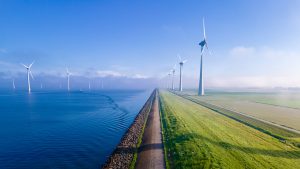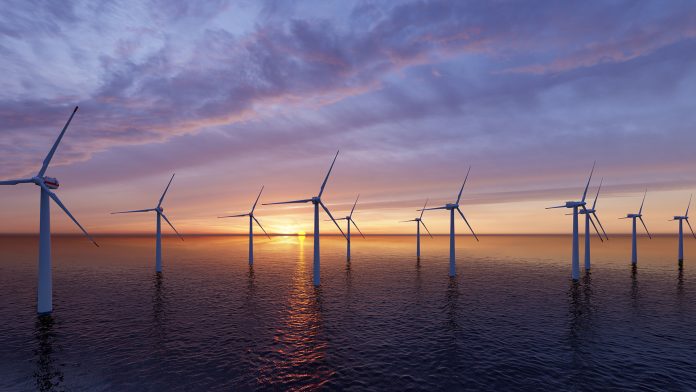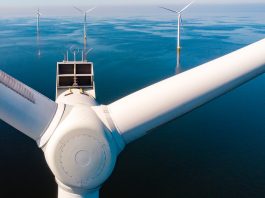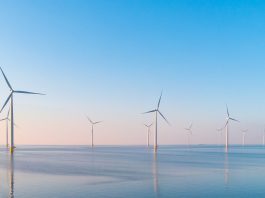David Wilson, Director of Development at MGH Offshore, discusses the quest for UK energy independence and the strides the company is making in the offshore wind sector.
The growth of offshore renewables, particularly offshore wind technology, is gaining significant attention as a reliable and proven clean energy source.
Boosting low carbon power generation capacity is central to the quest for UK energy independence, as it allows for the electrification of sectors such as heat and transport by using home-grown electricity to reduce reliance on imported hydrocarbons.
Despite the UK Government’s recent U-turn on its net zero commitments, MGH Offshore continues to support renewable projects in the offshore wind sector.
What is the current status of the UK’s energy independence, and how has it evolved in recent years?
Historically relatively self-sufficient in covering the domestic energy demand, the UK’s dependency on imports has increased in recent decades. With the government phasing out coal and the decline in the UK’s North Sea oil and gas outputs, by 2013, the UK’s energy dependence was just below 50%, reliant on supplies from overseas.
With the increase in wind-generated power, the UK’s reliance on overseas support is approximately 33%.
The government published the Energy Security Strategy in April 2022. It stated that the UK will speed up the energy transition to improve energy security and independence. Target areas for increased energy capacity are nuclear, renewables, and hydrogen, and supporting domestic natural gas production.
What role do renewable energy sources play in the UK’s efforts to achieve energy independence?
Boosting low carbon power generation capacity is central to the strategy as it will allow electrification of sectors such as heat and transport by using home-grown electricity to reduce reliance on imported hydrocarbons. This will be achieved by increasing targets for the following generation technologies:
- Nuclear: Increasing capacity from 8 GW today to 24 GW by 2050;
- Offshore wind: Increasing capacity from 11 GW today to 50 GW by 2030, including 5 GW of floating offshore wind
- Onshore wind: Increasing capacity from 14 GW today in line with local community views; and
- Solar: Increasing capacity from 14 GW today to 70 GW by 2030. Improvement in planning processes is planned to speed up both ground-mounted and rooftop solar deployment.

Industry concerns regarding regulatory challenges, lengthy delays to planning and consenting approval, and grid connection for renewable energy projects are well known. In response, the Strategy promises to cut consent time from four years to one.
Addressing the skills shortage in the renewable energy sector is crucial. Could you provide an update on the apprenticeship and graduate training programmes that MGH Offshore is developing in collaboration with education authorities and the public and private sectors?
The offshore wind sector needs many more people in the short, medium, and long term to power ahead. The industry is forecast to employ 104,401 people by 2030 to meet current targets, an increase of 6,936 since last year’s forecast. Currently, the workforce has increased to over 32,000, up 4% compared to the end of 2021.
MGH is engaging with local training providers and educational establishments, giving practical and timely updates as to the requirements for the offshore wind industry and helping these organisations design and fit their offerings for the industry’s needs.
You previously mentioned a potential shift from a contractor-based approach to direct hires in the offshore wind sector. How might this change impact the industry’s ability to meet installation targets, and what strategies is MGH Offshore considering adapting to this shift?
MGH is growing its core team of industrial experts across electrical engineering and fire and gas safety. This allows us to be able to react rapidly to support current and future clients across the globe. The benefit of having this core grouping allows consistency, standardisation, continuity, performance and delivery, ensuring our clients get the best services at all times.
With an international client base, it also makes it easier for us, our personnel, and our clients to deploy as all visa and travel requirements are handled from a central location. Our core team overseas local contract hires and allows us to instil the MGH ethos throughout every aspect of a project.
At MGH, we believe that having this approach benefits the clients by improving efficiencies and timelines, enabling all clients to reach their targets. It ultimately delivers a collaborative approach between MGH and our clients in the offshore wind sector.
Training new renewable energy professionals will be vital to overcome the skills shortage. However, how important is reskilling professionals from traditional energy sectors to meet this growing demand? Is there enough government support and incentives to help people make the switch?
UK energy workers are unconvinced the sector is adequately prepared for the transition to clean power sources, according to recent research. A little over 40% of personnel questioned believe the government is providing enough support to workers and those looking to reskill to achieve its own 2035 targets.
Nearly two-thirds of personnel currently working in industries like oil and gas felt the move to decarbonise the power system would put their jobs at risk by 2025. However, most personnel questioned said they would happily consider reskilling.
Do you think enough is being done to raise awareness about green energy careers? What can be improved?
I think it is impossible to escape the UK Government’s desire for net zero and, with it, the requirement for green energy careers. There is not a day that goes by when the media do not have a report directly supporting clean energy or are delivering a subliminal message supporting net zero.
If a change to the careers messaging could be suggested, it would be about the longevity of a career in the net zero industry.
Due to the short timelines for delivery of core net zero projects, a view among the population is that this is unachievable. In the long term, that view translates to unrealistic projects and, therefore, unsustainable career prospects. If a more realistic timeline was in place for projects, then it is believed there would be greater support for net zero projects.
Earlier this year you announced plans to establish a permanent office in Scotland. How has progress been and have there been any developments?
Our aim is to be in Scotland by the end of the year, and as such, we are in negotiations over several locations between Glasgow and Peterhead.
Supporting business growth and developing our own supply chain in Scotland is key to the ongoing success of MGH. This is a big move for us, and we want to get it right the first time.
With the Prime Minister’s recent U-turn on various net zero commitments, is this concerning for MGH Offshore? Does it show a lack of intent from the UK?
In short, the answer to the question is that it is not majorly concerning to MGH. With a focus purely on the North Sea, there is a huge amount of offshore wind programmes in the pipeline that have a significant working life span beyond that of most of our current employees. This is in addition to the current works in place.

Depending on your viewpoint, the PM’s announcement could arguably be for:
- Political gain;
- The introduction of more achievable timelines for net zero goals; or
- Viability of renewable energy to meet the UK’s needs
The announcement does not derail MGH and our approach to supporting renewable energy programmes in the offshore wind sector.









